
This The Division does competently. At its core, The Division plays like a traditional third-person cover shooter. Press space when near an obstacle, and your agent will stick to it like a Velcro spider, making them all-but invulnerable to attack. But enemies are similarly difficult to hit when in cover, and they also attack aggressively and use grenades to flush you out. Hence, your team needs to out-think as well as outgun your opponent, using one or two agents to lay down suppressive fire, while the others relocate to a vantage point or flanking position to take them out.
Hanging off this tactical framework like deadly Christmas baubles are a range of skills and abilities that players can employ to gain an upper hand, such as deployable cover, a remote-detonating explosive or, my personal favourite, an automated turret that can be thrown a short distance to provide covering fire. Unfortunately, the total number of abilities is fairly small, and some, such as the deployable turret, are far more useful than others, like the deployable cover.
While the tactical combat is robust enough, it lacks a killer edge, which I believe is largely down to the MMO-side of The Division. Both sides have fairly substantial health bars, while Medkits and healing opportunities are commonplace. This means that, for a tactical game, bullets don't have the lethality they should. In fact, and this is probably going to sound weird, I don't think the combat is violent enough; neither sufficiently realistic to be impactful nor stylistic enough to be interesting. Instead you disinterestedly mow down hordes of enemies who themselves barely react to being shot thirty times by an AK-47, further adding to my unease about the Division's disavowal of any thematic significance.
As you increase in level, the battles do become noticeably more intense. One mission that involved fending off flamethrower-sporting cleaners on the rooftop of an apartment block, was ferociously tough. Sadly, this example is an exception rather than the rule, and the cooperative side of the game generally lacks tension. The missions are formatted to the point where they quickly become predictable, and the combat simply doesn't have the snap it needs.
What's more, when not in combat, The Division's New York feels strangely flat. Partly, this is because the environments are literally flat, which is an unusual experience after so many games have emphasised visually complex terrain. But it's also because there's hardly any opportunity for emergent play. Other players can't be seen on the streets of New York, only in the Safe Houses which act as the game's social and fast-travel nodes. So the streets comprise yourself, a few wandering NPCs, and the odd group of enemies. It's bizarre and a little sad that so much effort has gone into sculpting The Division's fantastic environments, only for them to be used as locations to stuff collectibles into.
Thankfully, the Dark Zone goes some way to making up for this. The Dark Zone is the Division's PVP area, a walled-off section of Manhattan where, as the story explains, 'The virus hit hardest.' Enemies are considerably tougher in the Dark Zone, but they also drop much better loot. Before these goodies can be used, however, they must be extracted by Helicopter and then disinfected, after which they're placed in your Safe House stash.
Simple enough, right? Wrong. Calling in a Helicopter for a pickup is like ringing the dinner bell for other players. It's entirely possible they will simply want to extract stuff too, and they might even help you defend the area. But it's equally likely that they'll shoot you in the head and nick all your hard-won gear for themselves. Such deviousness won't go unpunished, however, as it marks you out on the map as a Rogue agent, essentially giving every other player in the area express permission to kill you.
The Dark Zone is easily the most fun you'll have with The Division. Unlike the rest of the game, every moment you spend behind those ramshackle walls is fraught with tension. If you're alone, every crackle of gunfire sends you scrambling for cover, and spotting other players in the distance will cause your heart to leap into your throat. If you're playing in a team, it's even worse, as there's every possibility your best mate will shoot you in the back and steal all your gear. Perhaps you should shoot them first, just to be on the safe side.
Sadly, the Dark Zone's dastardly delights equally highlight how comparatively shallow the other side of The Division is. The theme-park MMO structure that comprises the game's meat simply isn't that well suited to its disaster-movie setting. What deserves to be a dynamic, tactically thrilling experience is held back by hamster-wheel game design whose only long-term mode of engagement is to occasionally spit out a new gun. The Division could have been DayZ's daddy. Instead it's ended up Destiny's child, and is undoubtedly worse off for it.
Hanging off this tactical framework like deadly Christmas baubles are a range of skills and abilities that players can employ to gain an upper hand, such as deployable cover, a remote-detonating explosive or, my personal favourite, an automated turret that can be thrown a short distance to provide covering fire. Unfortunately, the total number of abilities is fairly small, and some, such as the deployable turret, are far more useful than others, like the deployable cover.
While the tactical combat is robust enough, it lacks a killer edge, which I believe is largely down to the MMO-side of The Division. Both sides have fairly substantial health bars, while Medkits and healing opportunities are commonplace. This means that, for a tactical game, bullets don't have the lethality they should. In fact, and this is probably going to sound weird, I don't think the combat is violent enough; neither sufficiently realistic to be impactful nor stylistic enough to be interesting. Instead you disinterestedly mow down hordes of enemies who themselves barely react to being shot thirty times by an AK-47, further adding to my unease about the Division's disavowal of any thematic significance.
As you increase in level, the battles do become noticeably more intense. One mission that involved fending off flamethrower-sporting cleaners on the rooftop of an apartment block, was ferociously tough. Sadly, this example is an exception rather than the rule, and the cooperative side of the game generally lacks tension. The missions are formatted to the point where they quickly become predictable, and the combat simply doesn't have the snap it needs.
What's more, when not in combat, The Division's New York feels strangely flat. Partly, this is because the environments are literally flat, which is an unusual experience after so many games have emphasised visually complex terrain. But it's also because there's hardly any opportunity for emergent play. Other players can't be seen on the streets of New York, only in the Safe Houses which act as the game's social and fast-travel nodes. So the streets comprise yourself, a few wandering NPCs, and the odd group of enemies. It's bizarre and a little sad that so much effort has gone into sculpting The Division's fantastic environments, only for them to be used as locations to stuff collectibles into.
Thankfully, the Dark Zone goes some way to making up for this. The Dark Zone is the Division's PVP area, a walled-off section of Manhattan where, as the story explains, 'The virus hit hardest.' Enemies are considerably tougher in the Dark Zone, but they also drop much better loot. Before these goodies can be used, however, they must be extracted by Helicopter and then disinfected, after which they're placed in your Safe House stash.
Simple enough, right? Wrong. Calling in a Helicopter for a pickup is like ringing the dinner bell for other players. It's entirely possible they will simply want to extract stuff too, and they might even help you defend the area. But it's equally likely that they'll shoot you in the head and nick all your hard-won gear for themselves. Such deviousness won't go unpunished, however, as it marks you out on the map as a Rogue agent, essentially giving every other player in the area express permission to kill you.
The Dark Zone is easily the most fun you'll have with The Division. Unlike the rest of the game, every moment you spend behind those ramshackle walls is fraught with tension. If you're alone, every crackle of gunfire sends you scrambling for cover, and spotting other players in the distance will cause your heart to leap into your throat. If you're playing in a team, it's even worse, as there's every possibility your best mate will shoot you in the back and steal all your gear. Perhaps you should shoot them first, just to be on the safe side.
Sadly, the Dark Zone's dastardly delights equally highlight how comparatively shallow the other side of The Division is. The theme-park MMO structure that comprises the game's meat simply isn't that well suited to its disaster-movie setting. What deserves to be a dynamic, tactically thrilling experience is held back by hamster-wheel game design whose only long-term mode of engagement is to occasionally spit out a new gun. The Division could have been DayZ's daddy. Instead it's ended up Destiny's child, and is undoubtedly worse off for it.

MSI MPG Velox 100R Chassis Review
October 14 2021 | 15:04

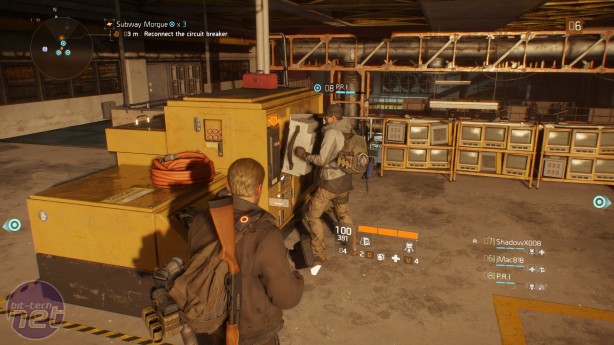
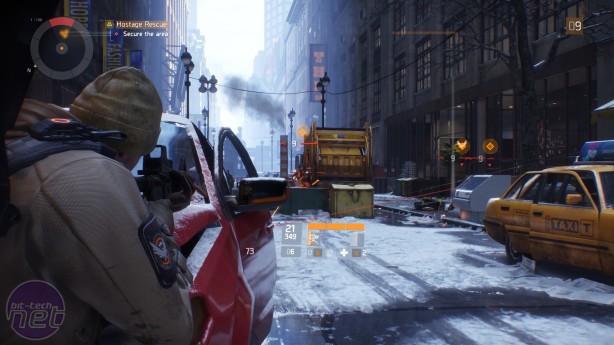
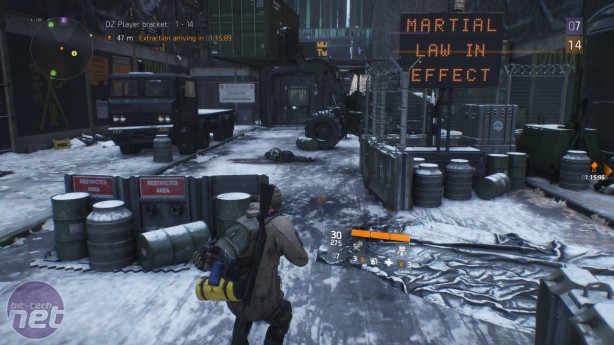
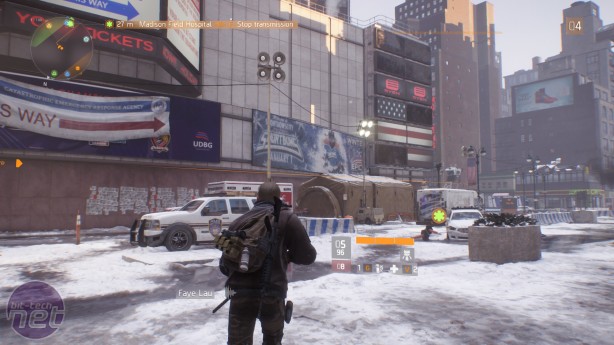
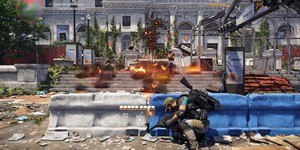







Want to comment? Please log in.